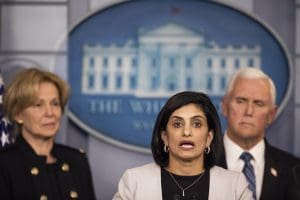White House briefing room once again in use thanks to coronavirus
The briefing room had gone dark, after Trump killed off the daily White House briefing a year ago.

The White House briefing room is back in business.
The historic White House setting had fallen into something of a state of neglect during the era of Donald Trump, who prefers to act as his own spokesman rather than send out his press secretary to brief reporters in the James S. Brady Press Briefing Room.
In recent months, it’s become a storage place for piles of journalists’ gear, step ladders and other equipment.
But with the arrival of the coronavirus threat in the U.S., Trump himself has made two appearances in the briefing room in the past week and Mike Pence and other officials briefed the press from the podium there on Monday.
“We will be back here every day. Get used to seeing us,” Pence said.
The room inside the West Wing was constructed in 1970 during the Nixon administration. Press secretaries appeared there to shape the message that administrations wanted to convey on important topics on the day. In turn, reporters asked a barrage of questions during sessions that often lasted for an hour or more and, in later years, were carried live on C-SPAN.
But the last formal briefing from a White House press secretary took place there nearly a year ago. Trump on Jan. 22, 2019, tweeted that he told then-press secretary Sarah Sanders “not to bother” with press briefings because “most will never cover us fairly.”
Trump prefers to take questions from reporters during Oval Office meetings with world leaders and in front of the presidential helicopter, Marine 1, before departing the White House.
That has changed in the last week. Trump held wide-ranging news conferences on Wednesday and Saturday in the briefing room to discuss how his administration was confronting the threat of the coronavirus, opine on a potentially historic peace accord with the Taliban in Afghanistan and continue his unyielding criticism of the Federal Reserve.
Most of all, he sought to calm the American people and markets.
“Whatever happens, we’re totally prepared,” Trump said Wednesday.
“It’s really nice to talk to you without the helicopter. I got to say that,” a reporter told Trump.
Another reporter asked if the briefings could become a trend.
“If you like it, we’ll do it,” Trump said.
Three days later, Trump was back in the briefing room for a news conference he had announced on Twitter with only about 90 minutes’ warning, leaving aides and reporters to scramble to get to the White House in time.
Trump’s Saturday news conference came on the same day that health officials confirmed the death of the first U.S. patient on American soil.
“We’re going to be very transparent,” Trump said. “We’ll be meeting you probably tomorrow or the next day. We’ll keep you abreast.”
The sudden flurry of activity in the briefing room came with one downside — the need to clean house.
“The bad news is that during this period of fallow, many of us started using the briefing room for storage, standups and as work space,” NPR’s Tamara Keith, a member of the White House Correspondents’ Association, told members in an email on Monday.
“With the resumption of briefings, we need to clean house. It isn’t safe to have gear, step ladders, cables, boxes of batteries, coats and backpacks all over the briefing room,” she wrote, “and we would all appreciate your cooperation in tidying up.”
Recommended

Biden campaign launches new ad focused on Affordable Care Act
Former President Trump has said he wants to do away with the popular health care law.
By Kim Lyons, Pennsylvania Capital-Star - May 08, 2024
Ohio doctors fear effects of emergency abortion care case set to go before U.S. Supreme Court
A federal law that allows emergency departments to treat patients without regard to their ability to pay will be under U.S. Supreme Court scrutiny this week, and Ohio doctors are concerned about the case’s local impact on emergency abortion care.
By Susan Tebben, Ohio Capital Journal - April 23, 2024
House GOP votes to end flu, whooping cough vaccine rules for foster and adoptive families
A bill to eliminate flu and whooping cough vaccine requirements for adoptive and foster families caring for babies and medically fragile kids is heading to the governor’s desk.
By Anita Wadhwani, Tennessee Lookout - March 26, 2024


















































































